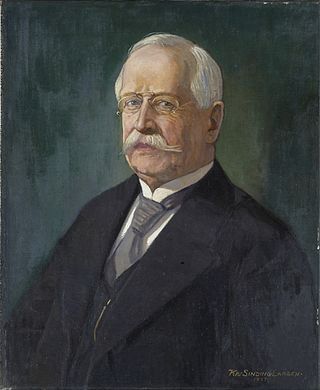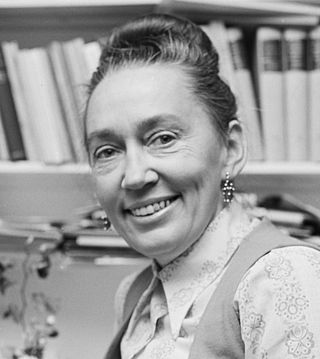
Otto Albert Blehr was a Norwegian statesman, attorney and newspaper editor who was the 8th prime minister of Norway from 1902 to 1903 during the Union between Sweden and Norway and from 1921 to 1923 following the Dissolution of the union between Norway and Sweden. He represented the Liberal Party.

Betzy Aleksandra Kjelsberg was a Norwegian women's rights activist, suffragist and a member of the feminist movement. She was a politician with the Liberal Party and the first female board member of the party.

Thekla Susanne Ragnhild Resvoll was a Norwegian botanist and educator. She was a pioneer in Norwegian natural history education and nature conservation together with her sister, Hanna Resvoll-Holmsen.

The Norwegian Association for Women's Rights is Norway's oldest and preeminent women's and girls' rights organization that works "to promote gender equality and all women's and girls' human rights through political and legal reform within the framework of liberal democracy." Founded in 1884, NKF is Norway's second oldest political organization after the Liberal Party. NKF stands for an inclusive, intersectional and progressive mainstream liberal feminism and has always been open to everyone regardless of gender. Headquartered at Majorstuen, Oslo, NKF consists of a national-level association as well as regional chapters based in the larger cities, and is led by a national executive board. NKF has had a central role in the adoption of all major gender equality legislation and reforms since 1884.

Karen Grude Koht was a Norwegian educationalist, essayist and feminist pioneer.
Anne Kari Lande Hasle is a Norwegian civil servant.

Margarete Ottilie Bonnevie was a Norwegian author, women's rights advocate and politician for the Liberal Party of Norway. A liberal feminist, she served as the 13th President of the Norwegian Association for Women's Rights (NKF) from 1936 to 1946 and is credited with reviving the liberal women's rights movement in the 1930s. Bonnevie said that NKF should work for solutions that are in the best interest of all women and society, "be the captain who keeps a steady course" in the struggle for equality and "set out the main policy objectives and seek to get the government, parliament and local government bodies to implement the reforms that are required."

Anna Hvoslef was a Norwegian journalist, conservative politician and feminist. One of Norway's first female professional journalists, she was the first woman to work as a journalist at the major newspaper Aftenposten and served as president of the Norwegian Association for Women's Rights 1930–1935.
Clara Ottesen was a Norwegian government official, economist, aid worker and politician.

Kari Skjønsberg was a Norwegian academic, writer and feminist.

Marit Johanne Aarum (1903–1956) was a Norwegian economist, liberal politician, civil servant and feminist.
Irene Bauer was a Norwegian senior government official, Labour Party politician and feminist. She served as president of the Norwegian Association for Women's Rights from 1988 to 1990. She also served as a political adviser to the Parliamentary Group of the Labour Party and as the Private Secretary to Minister of Trade and Industry Finn Kristensen in 1989. She served as a Director in the Ministry of the Environment from 1997. She has also worked at the Ministry of Petroleum and Energy. She was the mother of the noted comedian Thomas Giertsen.

Fredrikke Andrea Møllerup Mørck was a Norwegian liberal feminist, editor, and teacher. She served as the editor-in-chief of the women's rights magazine Nylænde from 1916 to 1927 and as the 10th president of the Norwegian Association for Women's Rights from 1926 to 1930.

Ingerid Gjøstein Resi was a Norwegian philologist, women's rights leader and politician for the Liberal Party. She served as president of the Norwegian Association for Women's Rights from 1952 until her death in 1955.

Kitty Bugge (1878–1938) was a Norwegian feminist and union leader. She served as the 12th President of the Norwegian Association for Women's Rights from 1935 to 1936. Bugge also founded the National Union of Female Telegraph Operators and served as its first President from 1914 to 1919 and again from 1921 to 1933. She was a board member of the Union of State Employees from 1923 to 1930. Bugge was a sister of the noted feminist, lawyer and diplomat Anna Bugge.
Sigrun Hoel is a Norwegian lawyer, academic, government official and feminist. She served as the 22nd President of the Norwegian Association for Women's Rights (NKF) from 1984 to 1988, succeeding supreme court justice Karin M. Bruzelius. Before she became the national President she was chair of the Oslo chapter from 1980 to 1984 and Vice President of NKF from 1982 to 1984. She was acting Gender Equality Ombud in 1984, 1988 and 1991.
Siri Hangeland is a Norwegian feminist, civic leader and politician.
Bjørg Krane Bostad is a Norwegian feminist, civic leader, civil servant, businesswoman and humanitarian.
Anna Louise Beer (1924–2010) was a Norwegian lawyer, judge and women's rights activist who was president of the Norwegian National Women's Council from 1973 to 1979.
Kvinnesaksnytt was a Norwegian liberal feminist journal on women's rights that included news and analysis of Norwegian and international women's rights issues, seen from the perspective of the liberal or mainstream women's rights movement. It was published by the Norwegian Association for Women's Rights, the country's main women's rights organization, from 1950 to 2016, and was Norway's main women's rights journal for 66 years. It was the successor of the association's earlier journal Nylænde (1887–1927), one of the most influential political magazines in Norway since the 1880s.













